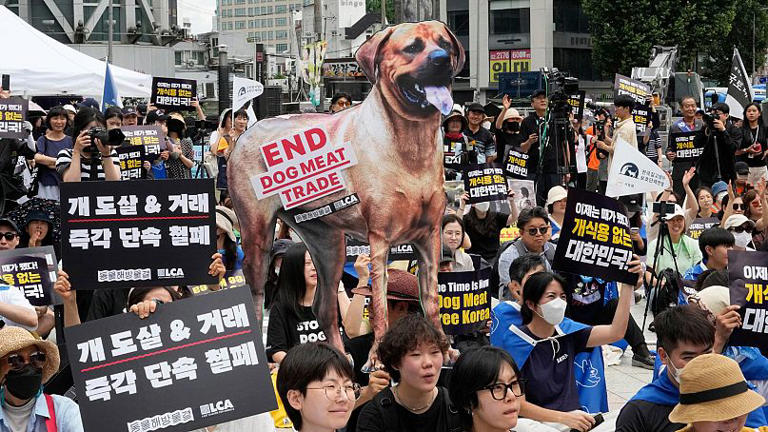![]()
![]()
![]()
![]()
![]()
![]()
![]()
South Korea plans to ban the consumption of dog meat by the end of the year
South Korea is planning to end the controversial practise of eating dog meat.
Although only a small minority of people still consume dog meat in South Korea, the ancient practise has been the subject of sharp criticism from foreign media and animal rights advocates. Now, the country’s younger generations have joined calls to ban it.
In a briefing on 17 November, the government said it plans to enact a special law within the year banning the breeding, slaughter, distribution and sale of dogs for food.
As part of this, dogs will be excluded from the country’s Livestock Act, thereby recognising their status as companion animals.
How common is dog meat in South Korea?
In 2022, South Korea’s national broadcaster KBS reported that more than half a million dogs were being raised for food across the country and 1,600 restaurants were selling dog meat.
As of February last year, there were 1,156 farms breeding dogs for meat and 34 slaughterhouses, according to the Ministry of Agriculture, Food and Rural Affairs.
A grace period of three years will be given to allow the industry to transition and close down, with crackdowns starting in 2027. Government support will also be provided to help with the transition.
Is South Korea’s dog meat ban likely to pass?
South Korea’s ruling conservative People Power Party is behind the latest calls for a ban on eating dog meat. Their biggest rival, the Democratic Party, has also said it supports a ban.
With an election looming in April 2024, the outcome is therefore unlikely to derail the decision.
A 2023 survey by animal rights group Korea Humane Society International (Korea HSI) and research agency NielsenIQ showed public support too, with 57 per cent of the 1,500 respondents in favour.
More than 86 per cent of the adults surveyed said they have no intention of eating dogs in the future, regardless of whether they had in the past.
It also found an increased negative perception of dog meat among those in their 40s and 50s, and increased consensus on the need to protect the welfare of the animals.
There has been some vocal opposition to the proposed ban, with an industry group rallying in front of the National Assembly building in Seoul following the announcement.
They said the law would “rob people of their basic right to eat” and “fail to protect farmers”, South Korean daily newspaper The Hankyoreh reports.


 How to resolve AdBlock issue?
How to resolve AdBlock issue?